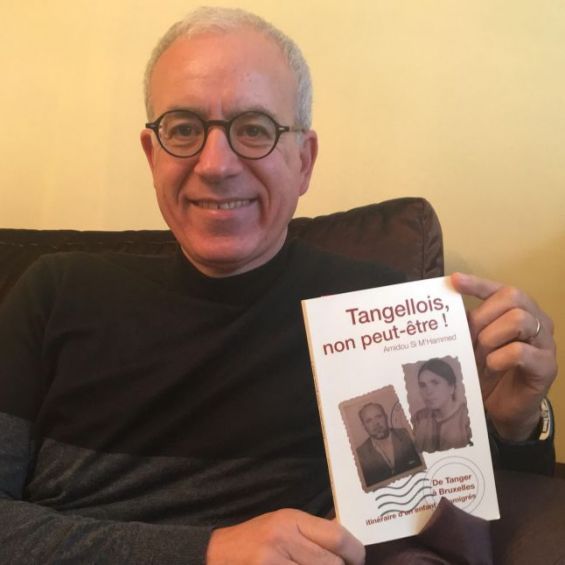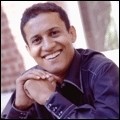Amidou Si M'Hammed was in born in Tangier 58 years ago. When he was 8 years old, he left Morocco to settle down in Brussels reuniting with his family. «I was born in a slum in Tangier», he proudly told Yabiladi. With a degree in political science and international relations, he got into social work, particularly supporting young immigrants in Belguim.
In the late 80s, Amidou became coordinator of the Maghreb Youth Association through which he used to organize homework schools, social and cultural activities, but also civic activities raising awareness among people regarding societal issues. «We were a group of young academics. Our role was to support young immigrants, including school dropouts. Youngsters from the Maghreb region were also very active in the political scene : «We demanded a better world, we dealt with the issues of discrimination experienced by a number of immigrants, racism, the right to vote and employment...».
His activities extended the borders of Belguim : «At the time, we tried to get in touch with other Maghreb associations with the same objectives in France, Spain and the Netherlands to have an idea about the problems encountered by immigrants in these countries».
Immigration
In his book, «Tangellois, non peut-être», released in November 2017, Amidou tells the story of his family, that left Morocco for Europe boarding on a moving journey marked by optimism.

His father, a construction worker, lost his job and his family was penniless. «My father worked for a big construction firm, but the latter was losing ground in the market», he told Yabiladi. Indeed, Morocco's economic situation in the 1960s affected several companies which eventually led to their bankruptcies.
Feeling desperate due to this uncertain future, Amidou's mother encouraged her husband to cross the Mediterranean. «My mother managed to convince my father to apply for a passport», he said. Discouraged by the long queue, his father then joined his friends for a cup of tea. «My mother was adamant and made him try again 'Layachi, tomorrow you go get your passport. Otherwise, I'll wait for you with a bludgeon in the hand and you will not go home», he recalled. «My father did not have the right to fail, the whole family had contributed to help him go to Europe».
Finally, Amidou's father managed to obtain his passport. «My father relied heavily on the solidarity of other Moroccans already settled down in Belgium», he declared. Once in Brussels, he was hosted by a friend, who also offered him a job in a construction company.
Two years later, Amidou and his mother, brothers and sisters followed. «My father lived alone for two years, then we joined him through family reunification programs», he added.
Education first and foremost
Son of a father and mother who never attended school, Amidou went to the local school in his neighborhood in Tangier. «I attended a Moroccan public school for a while. Unfortunately, I don't remember that period of my life». At the Belgian school he was one of the only new students : «I was eight, the other kids were only six. We were 15 schoolchildren, so it was easy for my teacher to give me personalised attention».
«Europe is a great opportuity to ensure that these children can go to school. I sincerely believe that school was part of my parents' migration project. For my mother, education was an important component of her migration project».
For Amidou, school was a place of great fulfillment. «At school, we are taught to build, construct, to be rational, to question everything... But sometimes it went against certain values that my parents believed in and considered as important», he explained.
Living in a double culture, it was not always easy for Amidou to combine the two cultures while building his own personality. «For a long time, I did not like the Christmas period because it was a source of frustration for me. It is an important date here where there is a feeling and a festive atmosphere. But at home, we did not celebrate,» he said. «My mother bought me and my brothers and sisters a Christmas log cake to lessen that frustration. She was illiterate but was very clever.»
The opportunity to go to school seems to have greatly affected Amidou. «My mother was attending parents' meetings. She was illiterate, a foreigner to a teacher with a more rewarding status. My mother was aware of the role schooling plays in society. It was a way for her to get us integrated in this society,» he said.
An intercultural approach to overcome misunderstandings
Aware of the difficulties of living together, Amidou believes that only the intercultural approach can avoid misunderstandings and help people co-exist in a cosmopolitan city like Brussels. Indeed, Amidou thinks that the quality of a society is measured by what it gives to the disadvantaged. «There are many misunderstandings in the Belgian society. So we tried to explain as Belgians, to other Belgians, certain behaviors they could not understand,» he pointed out.

«The last time I went to Morocco was in 2013. I was able to discover Marrakech. Morocco represents my roots ... Obviously there are things that are lacking. I am not insensitive to what is happening in Morocco. This country will always be a part of me. On the other hand, Belgium is my country of socialization,» he told us when asked about his homeland. And Amidou concludes : «In my book I am trying to link the two cities, Tangiers and Brussels. The latter is the city where I lived my teenage years, youth, and my current home. I lived 8 years in Tangier and 50 years in Brussels, so necessarily Brussels represents more for me.»
Amidou, through the migratory experience of his family, claims a fairer, more united and more egalitarian world among the citizens of the same country. Since 2004, he is advisor to the cabinet of the Secretary of State for the Brussels-Capital Region, also Minister-President of the College of the French Community Commission, Fadila Laanan.




 chargement...
chargement...











